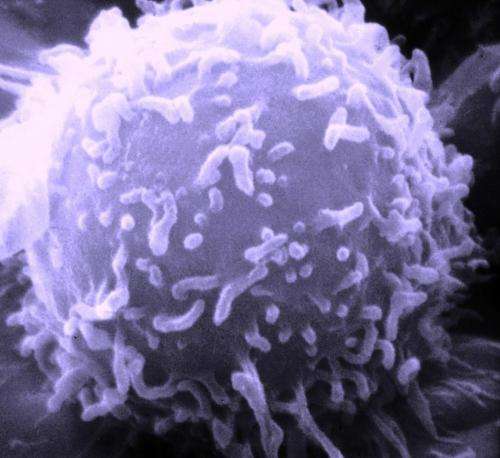New prognostic markers for colon cancer identified

Gut-associated lymphoid tissue represents an integral part of the immune system. Among the powerful players of the mucosa-associated lymphoid tissue are isolated lymphoid structures (ILSs). Additionally, researchers have shown that in the course of cancer, ectopic lymphoid structures (ELSs; also known as tertiary lymphoid structures, TLSs) are formed at the tumor site. Both ILSs and ELSs act as multitasking information centers triggering multifaceted immune responses.
An in-depth understanding of the complexity and functionality of ILSs and ELSs may lead to new directions in therapeutic interventions and/or provide help in treatment decisions as part of personalized medicine. A study recently published by researchers from MedUni Vienna and collaborative partners proposes ILSs as novel prognostic players orchestrating the pathobiology of metastatic colorectal cancer.
Cumulative data within the rapidly evolving field of immuno-oncology positions tumor infiltrating B cells among powerful contributors to anti-tumor immunity. One essential aspect that links the B-cell biology, adaptive immunity and the inflammation process to the tumor microenvironment is based on the unique ability of B cells to form ELSs. Central to this are germinal center reactions, which involve the coordinated action of various immune cell types with a central role given to B cells.
Key information that needs to be considered for understanding the ELSs in solid tumors is that there are tissue types where such lymphoid structures physiologically appear to fulfill an important balance between effective and protective immune response and self-tolerance. "This holds true for organs with specialized immunity at epithelial barriers. Among those is the gut-associated lymphoid tissue with the ILSs being among the most powerful players," says Diana Mechtcheriakova, principal investigator and the head of Molecular Systems Biology and Pathophysiology Research Group at the Institute of Pathophysiology and Allergy Research, Medical University of Vienna. "We aimed to investigate whether there is a link between the patient-specific characteristics of pre-formed isolated lymphoid structures in non-tumorous colon tissue and the disease pathobiology for patients with metastatic colorectal cancer."
In this study, the multidisciplinary research team implemented newly developed integrative strategy named DIICO/from Digital Immune Imaging to Clinical Outcome. DIICO is based on digital tissue image cytometry, which enables researchers to transform encrypted tissue information on immune cells and structures into numerical data for alignment with disease-relevant parameters. Important additive information was obtained by B-cell clonality assessment and a comprehensive analysis of omics data.
The authors showed that the properties of ILSs in non-tumorous colon tissue predefine the immune phenotype of ELSs at primary and metastatic sites. They discovered that B-cell-enriched and highly proliferative lymphoid structures are prognostic toward an improved clinical outcome for patients with metastatic CRC. The knowledge gained from this study expands the understanding of tumor-immune interactions and draws particular attention to the anti-tumor immune response guided by isolated lymphoid structures outside of tumor tissue.
More information: Felicitas Mungenast et al. The Immune Phenotype of Isolated Lymphoid Structures in Non-Tumorous Colon Mucosa Encrypts the Information on Pathobiology of Metastatic Colorectal Cancer, Cancers (2020). DOI: 10.3390/cancers12113117



















